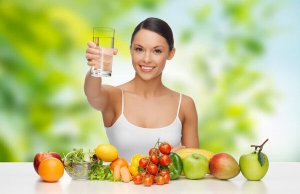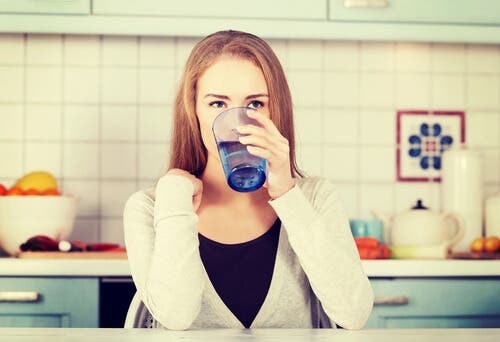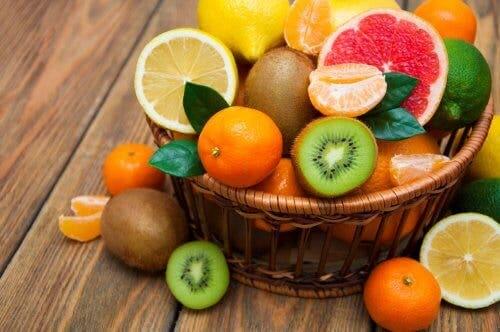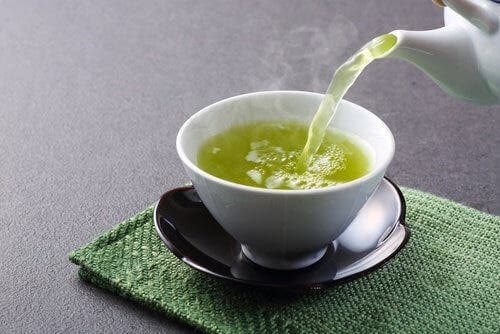Diet for Dehydration: What You Should Consider

Dehydration is when the body doesn’t have enough water to be able to carry out its functions correctly. To prevent this problem (which can also have health consequences both in the medium and long term), you can implement a special diet for dehydration.
Every person needs to drink a certain amount of water (depending on their age, weight, and sex) throughout the day. However, this intake shouldn’t only come from glasses of water, but also from food.
According to the World Health Organization, 20% of our daily needs must come from fruits and vegetables.
Some people need to pay more attention to ways of preventing dehydration, since they’re more likely to suffer from it if they don’t take the corresponding measures. This is because, for one reason or another, their bodies expend more liquid, through sweating, the frequency of urination, and so on. The most vulnerable are:
- Children
- Athletes
- Pregnant women
- Patients with chronic diseases
- The elderly
These people should monitor their consumption of water, as well as foods rich in this liquid, even more.

Diet for dehydration: foods that you must consume
Food makes up approximately 30% of the body’s fluid intake; the other 70% is considered to be the product of the drinks consumed. It’s important to know the solid foods that contain the most water in order to achieve a balanced diet.
Vegetables
Vegetables contain a lot of vitamins and nutrients, which are important for health. Some of them provide more water than others. For example, lettuce is one of the most beneficial in a diet to prevent dehydration. 95% is water and its freshness makes it the best ally of summer salads.
Other vegetables, such as broccoli, spinach, and carrots, also contain a lot of water. The ideal thing is to steam them so that they don’t lose their properties.
You can find many very healthy and tasty recipes based on these ingredients.
Fruits

Watermelon, citrus fruits, and other seasonal fruits are sources of water. In addition to their nutritional benefits, they help regulate blood pressure in a diet for dehydration. They can be used as desserts, snacks, or juices.
Some people feel more comfortable drinking fruit juices, also because they’ve gotten used to it. There are many alternatives so you can make fun recipes too.
Water-based foods
Sauces and soups are other recipes that allow the body to get fluids. The same goes for ice creams, smoothies, and shakes, etc. It’s important to follow a diet that includes different options so you don’t get bored.
This article may interest you: Do You Know How and When to Drink Water?
Pasta and cereals
Rice absorbs a lot of water while it’s cooking, and this can benefit the body. For the most part, pastas are estimated to contain 70% liquids. Their advantage is that they can be eaten hot or cold, however you prefer.
Tips to prevent dehydration

Even if you don’t feel thirsty, this doesn’t mean that your body doesn’t need liquid. Therefore, you must always have a bottle of water on hand to drink a little every so often during the day.
Read on to learn more: How to Make Homemade Electrolyte Beverage to Prevent Dehydration
If you aren’t used to it, a good way to drink more water is to opt for infusions, teas, or other drinks that you like in order to get used to including liquids in your daily routine.
You don’t have to drink water exclusively. In fact, experts have proven that people drink more liquids when they choose drinks they like. Sweet and caffeinated drinks are good options in a diet for dehydration.
Experts recommend that adults drink approximately two liters of water a day to avoid dehydration.
What are the symptoms of dehydration?
- Thirst
- Fatigue
- Dizziness
- Nausea
- Dry mouth
- Dry eyes
- Headache
- Muscle cramps
- Changes in urine color, among others
In conclusion, to avoid dehydration, you must have good lifestyle habits, regardless of the time of year. However, during the hottest seasons, it’s true that you have to pay more attention to the amount of water you drink. As in everything, prevention is always the best way to avoid negative health effects.
All cited sources were thoroughly reviewed by our team to ensure their quality, reliability, currency, and validity. The bibliography of this article was considered reliable and of academic or scientific accuracy.
- (2008). Deshidratación, tipos y causas. Nutrición. [Documento en línea] Disponible en: http://www.nutricion.org/publicaciones/pdf/Deshidrataci%C3%B3n%20Tipos%20Causas%20y%20Consecuencias_Rosa%20Mar%C3%ADa%20Ortega.pdf
- ¿Cómo prevenir y tratar la deshidratación? Universidad de Guadalajara. [En línea] Disponible en: http://www.cucs.udg.mx/sites/default/files/uapsu.pdf
This text is provided for informational purposes only and does not replace consultation with a professional. If in doubt, consult your specialist.








